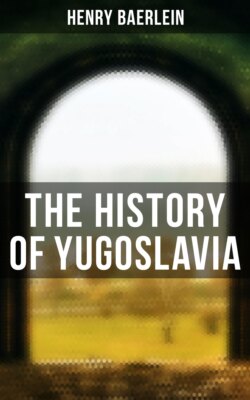Читать книгу The History of Yugoslavia - Henry Baerlein - Страница 53
На сайте Литреса книга снята с продажи.
IN SERBIA THE PEOPLE ARE FIGHTING FOR FREEDOM
ОглавлениеThis system of tutelage may have had its irksome moments; the Turkish rule in Serbia was such that any people with blood in their veins were bound to rebel. Sooner or later a race like the Serbs, who lived always with the songs of their old heroes and who gloried in their heiduks, were sure to dash themselves against this alien master. Kara George had seen that the Serbs in the Banat were prosperous, while in Serbia they were obliged to stand and watch the janissaries come back to the pashalik of Belgrade, though the Turks had sworn this should not be. Then the match was set to the fire—in January 1804 the Da-Hi, the chiefs of the janissaries, after having slain Mustapha Pasha, the enlightened Turkish Governor, who was known affectionately as "the mother of the Serbs," cut off the heads of a number of Serbian leaders; seventy-two of them on pikes were made into an awful avenue of trees. But even as the snowstorms beat against these Serbian heads, so Kara George and his companions from Šumadija, the heart of Serbia, flung themselves against the janissaries and vanquished them. This was what the Serbs had started out to do, and so for the moment Constantinople had been content to look on. However, when the Sultan was told that his unruly vassals had seized the whole of Šumadija and the departments of Valjevo and Pojarevac, he sent against them the Pasha of Bosnia, who demanded that they should lay down their arms. But now the Serbs had seen what some day they might struggle to—the liberation of their country. They had climbed a few steps up the stony path, they would not let themselves be lured back to the plain. Let Austria or some other one of the Great Powers guarantee their rights. The Pasha would not hear of it, and so these few undaunted men resolved to fight the Turkish Empire. An army came at once to stamp them out, and at Ivancovac they scattered it. From now they would fight on alone.[37] Their leader was the sort of man they wanted, a brave heiduk who was never weary, who had taken up one day a large rock and had flung it down a precipice, and who would do the same, they fancied, to a follower of his, if he saw fit. … The Serbs were left to fight alone, but the Great Powers took an interest in their future. We find in a report from the French Ambassador in Petrograd to his Minister of Foreign Affairs (No. 261 in the "Excerpts from the Paris Archives relating to the history of the first Serbian Insurrection," collected [Belgrade, 1904] by Dr. Michael Gavrilović, now the Minister in London) that the treaty of alliance stipulated for Russia to have Moldavia, Bessarabia, Vallachia and Bulgaria; France to have Albania, part of Bosnia, Morea and Candia; Austria to have Croatia and part of Bosnia; while Serbia was to be independent and given to a prince of the House of Austria or to any other foreign prince who married a Russian Grand Duchess. According to another scheme which the Ambassador forwarded, Austria was to have Serbia in complete possession as an Austrian province, and Croatia to belong to Austria or France, as Napoleon might decide. … Serbia had to fight alone, and unluckily her ranks were anything but closed. The lack of education brought about some childish jealousies, such as that of Mladen Milanović, who was ordered by Kara George to go to the relief of the Heiduk Veliko at Negotin, where 18,000 Turks were besieging him. "He may help himself!" quoth Mladen. "His praise is sung to him at his table by ten singers, mine is not. Let him hold out by himself, the hero." Veliko sent word to say that at the New Year (when Kara George and his chieftains were wont to meet in consultation) he would inquire as to how the country was being governed. But before then he was dead—shot by the Turks, who recognized him while he was going the rounds; and after five days his troops, in despair, made their escape across a morass and scattered.
